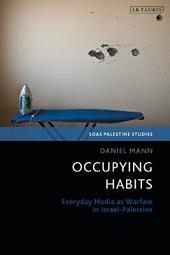
|
Occupying Habits: Everyday Media as Warfare in Israel-Palestine
Hardback
Main Details
| Title |
Occupying Habits: Everyday Media as Warfare in Israel-Palestine
|
| Authors and Contributors |
By (author) Daniel Mann
|
| Series | SOAS Palestine Studies |
|---|
| Physical Properties |
| Format:Hardback | | Pages:192 | | Dimensions(mm): Height 234,Width 156 |
|
| ISBN/Barcode |
9780755633906
|
| Classifications | Dewey:355.4 |
|---|
| Audience | | Professional & Vocational | |
|---|
| Illustrations |
30 bw illus
|
|
Publishing Details |
| Publisher |
Bloomsbury Publishing PLC
|
| Imprint |
I.B. Tauris
|
| Publication Date |
24 March 2022 |
| Publication Country |
United Kingdom
|
Description
How did the Israeli military learn to cope with the ubiquity of media technologies that routinely document their power abuses? Why did they re-appropriate these to tighten their grip on Palestinian civilians? This book explains why a high-tech nation with advanced military technologies came to rely on the everyday media habits performed by soldiers and civilians. Daniel Mann argues that the intensification of the security regime in Palestine, and the increasingly personal use of media technologies by both soldiers and civilians, are deeply entangled. The book traces how, beginning in the 1990s, the integration of media into the lives of civilians and Israeli soldiers enabled Israel to transfer responsibilities to individual users, who in turn became legally and ethically liable for state abuses of power. Drawing on declassified documents, found footage, and social media, Mann shows how both media and warfare have been remodelled around the figure of the defensive, isolated, and insular 'individual'. Mann suggests that the focus on representations and their close visual analysis paradoxically hinders our ability to understand media. Instead of zooming into fine details, we must step back to reveal the assemblage of images, users, and infrastructure that together serve to maintain the racial, legal and aesthetic divide between Israel and Palestine.
Author Biography
Daniel Mann is Lecturer and Leverhulme Early Career Fellow at the Film Studies Department at King's College London, UK. He has published various articles on visual media and is a filmmaker with awards from film festivals including the Berlin Film Festival, Rotterdam, Cinema du Reel, Centre Pompidou and the ICA in London. He received his PhD from Goldsmiths, University of London, UK.
Reviews"Drawing on a unique and extensive archival and open-source research the book follows Palestinians exposing violations on their smartphone cameras and Israeli soldiers mimicking the practice with their own devices for both propaganda and operational reasons. Here media becomes itself a terrain of conflict and the means by which it unfolds. A compelling read on every page, the book brings together Mann's sensibility as a filmmaker to narrative and visual form and his scholarly attention to theoretical and historical context". * Eyal Weizman, Goldsmiths, University of London, UK * "Occupying Habits reveals how Israel's military has usurped existing habits of shooting, tagging and sharing images, underscoring that the increased visibility of the military's routine procedures of repression has not led to the contraction of colonial power. Rather, Daniel Mann shows how the military absorbs everyday media practices and transforms them into effective elements of warfare. This profound intervention is as insightful as it is urgent, changing the way we understand the military's use of social media." * Neve Gordon, Queen Mary, University of London, UK * This is a theoretically rich and salient study of the important, contradictory, and ubiquitous presence of media technologies as embedded in soldiers' everyday lives and simultaneously integral to the functioning of the security, surveillance, and military regime in Israel/Palestine. Offering us the concept of habitual media, Mann moves beyond discussions of the power of the image and the normalization of occupation to consider how the flexibility of images, networks, computers, algorithms and information enable military and colonizing power. * Helga Tawil-Souri, NYU, USA *
|